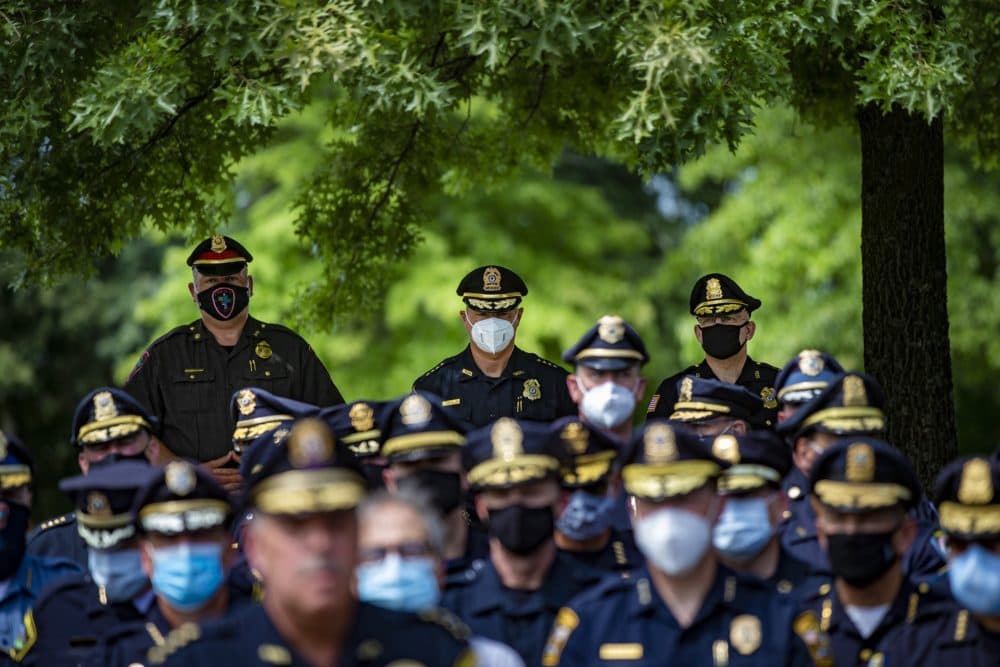Advertisement
Here's What's In The Massachusetts Police Reform Law

Update: Gov. Charlie Baker signed an amended version of the police reform bill into law on Dec. 31.
Some of the biggest changes in years to law enforcement oversight and rules are coming to Massachusetts.
That’s after Gov. Charlie Baker signed into law on Dec. 31 of last year a landmark police reform bill.
Police lobbied hard against the bill. They say it gives too much oversight to people without law enforcement experience. Meanwhile, some progressives say the bill doesn’t go far enough to end things like facial recognition and qualified immunity protections.
But the new law is the compromise lawmakers came up with. This year, we’ll be tracking whether the bill delivers on key promises. Here’s what those new rules dictate:
Creation Of A New Commission To Certify Police Officers Statewide
For the first time, Massachusetts will have a system to certify and decertify officers across the commonwealth. The new Peace Officer Standards and Training (POST) commission will have the power to investigate misconduct independently, with subpoena power to compel witnesses and documents as part of its investigations.
The governor and attorney general will appoint the nine-member commission — six of those members will be from outside law enforcement. A current police chief will serve, along with a retired Superior Court judge and a social worker.
The POST commission can undertake its own investigations, including identifying patterns of unprofessional police conduct, escalating behaviors or other increasing complaints against an officer or agency.
An earlier version of the bill would have also given the POST commission power to set training standards, but that was removed after Baker said training for police shouldn’t be handed over to a civilian-control commission.
Slight Changes To Qualified Immunity, And The Promise Of A Study
Qualified immunity — a legal doctrine that provides protection to public officials, including police officers, in civil lawsuits — was one of the most contentious parts of the debate around reforms. The compromise bill doesn’t go as far as the earlier Senate version, which would have put the burden on public officials to make the case as to why they weren’t liable in a civil suit.
The compromise bill ties qualified immunity to decertification. If a police officer is decertified by the state, he or she loses immunity. But some legal experts question the wording of the legislation, which states only officers who violate a person’s right to “bias-free policing” and are decertified lose their qualified immunity protections.
Bias-free policing means decisions made without considering a person's race, ethnicity, sex, gender or other aspects. Many civil rights violations that are subject to lawsuits aren’t about bias necessarily, but about actions like excessive force or wrongful arrest. So some lawyers doubt that this provision changes much in practice.
Advertisement
Advocates are also disappointed that the provision leaves in language about “threats, intimidation and coercion” in the state civil rights law. That makes it difficult to sue police officers for a civil rights violation unless the officer explicitly threatens, intimidates or coerces the plaintiff in some way. (For example, just punching a person excessively isn’t enough, the officer would have had to explicitly threaten or intimidate the person before throwing the punch.)
Stronger Facial Recognition Rules
Law enforcement can ask in writing for the RMV, FBI or state police to run a facial recognition search. They need a warrant from a court, except for certain emergency situations, such as if there is “substantial risk of harm” to someone or to identify a deceased person.
Agencies need to document each facial recognition search and provide that information to the state.
A commission will study the government use of facial recognition technology.
Boston already banned facial recognition this year, along with several other smaller communities.
A Task Force To Study Body Camera Regulations
Body camera use across the state varies from department to department. The state public safety agency will create a task force that will propose a uniform code for the purchase and use of body cameras, requirements for storage and transfer of the recordings and discipline for not using the cameras correctly. There will be at least five public hearings on the issue.
Review Of The Civil Service System
Civil service is the system most departments use to hire and promote applicants. The bill would create a legislative commission to review the law, and recommend changes to improve diversity, transparency and representation of the community.
The civil service laws are often blamed for exacerbating the lack of diversity in hiring and promotion, and protecting those who are disciplined. As part of Boston’s police reform recommendations, Mayor Marty Walsh is seeking a change to the civil service law to allow the city to prioritize local hiring — including Boston high school graduates — and advance officers of color.
The commission will look at creating a statewide diversity office within the state Office of Administration and Finance that would oversee implementation of any plans and monitor noncompliance. It also will review the possibility of appointing a diversity officer for every city or town with a fire or police department.
Stronger Use-Of-Force Policies And Rules For 'Less Lethal' Weapons
The bill bans chokeholds entirely, restricts officers from firing into a fleeing motor vehicle unless there’s a risk of imminent harm and creates rules around the use of tear gas, dogs or rubber bullets.
Boston’s policy currently allows the use of chokeholds in cases where deadly force is necessary; this law would forbid them in all cases. Boston officers already are restricted from shooting at moving vehicles, except when threatened with deadly force.
The legislation adds restrictions on using tear gas, rubber bullets or dogs. Officers need to have tried deescalation tactics, and the harm from the “less lethal” option needs to be proportionate to the threat from the person or group targeted. Any use of tear gas, rubber bullets or dogs needs to be reported to the POST commission.
Before planned mass protests or demonstrations, police departments are required to “attempt in good faith” to communicate with organizers of the event.
Police will have an explicit duty to intervene and report if a fellow officer is using unreasonable force. And police departments will have to have a policy and procedure for officers to report abuse by a colleague without fear of retaliation.
Investigates Structural Racism
Three special legislative commissions will look at institutional racism in jails and prisons, probation and parole. They’ll investigate disparities in the treatment of people of color and whether structural racism is the cause, and recommend changes.
Removes Requirement That Schools Have Officers, And Restricts Disclosure Of Student Information
Current law mandates that every school have a School Resource Officer, often called a SRO. The compromise now leaves it up to school superintendents to place a request with the community's police chief for an appointed SRO. Schools and local police departments will enter into a memorandum of understanding (MOU) to formalize and clarify the partnership between the school and the SRO, with that MOU filed with the state’s Department of Elementary and Secondary Education (DESE).
The bill also forbids school department personnel and SROs from disclosing certain student record information to law enforcement officials, except in certain cases where the student, parent or guardian has provided informed written consent, or to comply with a court order or subpoena in connection with a health or safety emergency as defined by DESE regulations.
Implements Changes For State Police
While much of the bill has local policing in mind, it does apply to members of the Massachusetts State Police as well. All troopers will have to be certified by the POST commission, and are subject to the rules to maintain that certification. The POST commission will also oversee training at the State Police Academy in New Braintree.
The bill also includes language championed by Gov. Baker that would allow the head of the state police to be appointed from outside the agency. Current law requires the colonel be promoted from within the ranks. Critics say this practice may have contributed to a culture that has allowed for numerous scandals within the agency over the years.
There’s a nod to the recent state police overtime scandal, too. “Knowingly” submitting a false timesheet will be a crime, with a fine of three times the amount of fraudulent wages collected and up to two years behind bars.
Other Notable Aspects Of The Proposed Law
- Law enforcement officers who have sex with or indecently assault a person in custody can be charged with rape or indecent assault and battery.
- No-knock warrants are restricted. Police officers will have to show that there are no children or people over age 65 in the home targeted, and that announcing themselves would cause life-threatening harm. Those warrants will only be approved by a judge if there’s evidence that it would be life-threatening to the officer or others to announce their presence.
- Expands expungement from one criminal or juvenile record to two.
- The bill creates eight commissions. Among them: permanent commissions to study the status of African Americans, Latinx people, those with disabilities, and Black men and boys. Other commissions will focus on studying a statewide cadet program, corrections officer training, consolidating police academies and the use of emergency hospitalizations.
- It increases transparency. The Department of Public Health will collect and report data on police-involved injuries and deaths, including those at correctional facilities. The bill clarifies that records on police misconduct investigations are subject to the public records law; Many departments shield open investigations from public view. And the POST commission will each year report a plethora of data, including details about officers decertified, those suspended, and how many retrainings were ordered.
Correction: Due to a reporting error, an earlier version of this article contained an incomplete description of how the new law limits the use of facial recognition.
This article was originally published on December 01, 2020.

